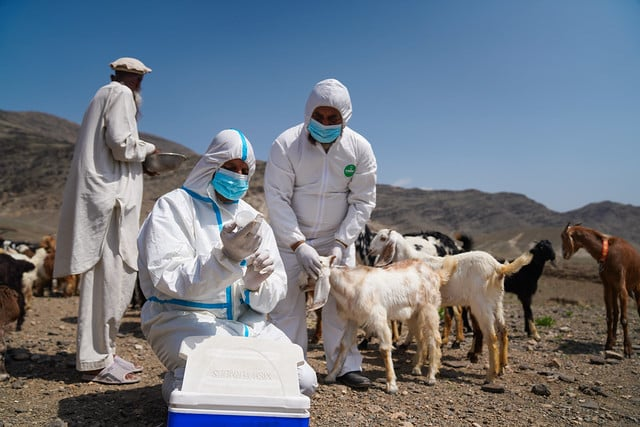RASC News Agency: Afghanistan is facing an unfolding agricultural disaster as a highly contagious livestock disease Peste des Petits Ruminants (PPR), commonly known as the plague of small ruminants now threatens the survival of more than 21 million sheep and goats across the country. The Food and Agriculture Organization of the United Nations (FAO) warns that without urgent and coordinated action, the epidemic could decimate herds, devastate rural livelihoods, and push millions of Afghanistanis deeper into hunger and poverty.
In a statement issued on Tuesday, November 11, FAO announced the launch of a nationwide vaccination campaign with financial support from the Asian Development Bank and the Government of the United Kingdom. The initiative aims to prevent the spread of the deadly virus and mitigate its potentially catastrophic impact on Afghanistan’s already fragile rural economy.
Experts describe PPR as one of the most destructive viral infections affecting small livestock. It can wipe out up to 80 percent of infected herds, leaving entire villages without their primary source of food and income. Yet, in Afghanistan where decades of conflict, administrative collapse, and the Taliban’s mismanagement have eroded veterinary infrastructure the threat is magnified.
“When governance fails, even the smallest virus becomes an empire of destruction,” one agricultural specialist told RASC, warning that the lack of a functioning veterinary network under Taliban rule has created “a perfect storm” for epidemic spread.
FAO’s emergency response plan focuses on three critical pillars:
• Mass livestock vaccination,
• Comprehensive field surveillance and reporting, and
• Community awareness programs aimed at training local herders in early detection and prevention.
Local veterinary teams, many operating under challenging conditions and without stable funding, have been deployed to multiple provinces, racing against time to contain the disease before winter migration begins.
Environmental factors have worsened the situation. Years of drought, loss of pasturelands, and climate-induced displacement have pushed livestock into densely populated grazing areas creating ideal conditions for viral transmission. FAO reports that herders in northern and western provinces are being forced to sell or slaughter weak animals, deepening economic despair in regions already crippled by isolation and neglect.
Despite the escalating crisis, Taliban authorities have provided little visible support or coordination. The de facto regime’s focus on ideological enforcement such as restricting women’s movement and policing dress codes has come at the cost of effective governance in public health and agriculture. Provincial departments that once worked alongside international partners to monitor animal diseases have been hollowed out or replaced with untrained loyalists.
The United Nations has warned that the consequences of inaction could extend far beyond the farms. In a recent statement, UN officials stressed that Afghanistan’s food security is inseparable from the health of its livestock, as sheep and goats remain vital for the survival of millions of rural families.
“Protecting livestock health is not merely an agricultural priority it is a humanitarian imperative,” the FAO said. “Every lost animal means another Afghanistani family pushed closer to hunger.”
More than 60 percent of Afghanistan’s population relies directly or indirectly on livestock for sustenance. If the PPR outbreak continues unchecked, analysts predict a collapse in the rural economy, mass displacement, and a surge in food insecurity further deepening the humanitarian crisis in a country where governance has been replaced by repression.
For Afghanistan’s herders, the plague spreading across their flocks is more than a biological threat it is a symbol of a nation abandoned, where disease and despair have filled the void left by broken governance.






